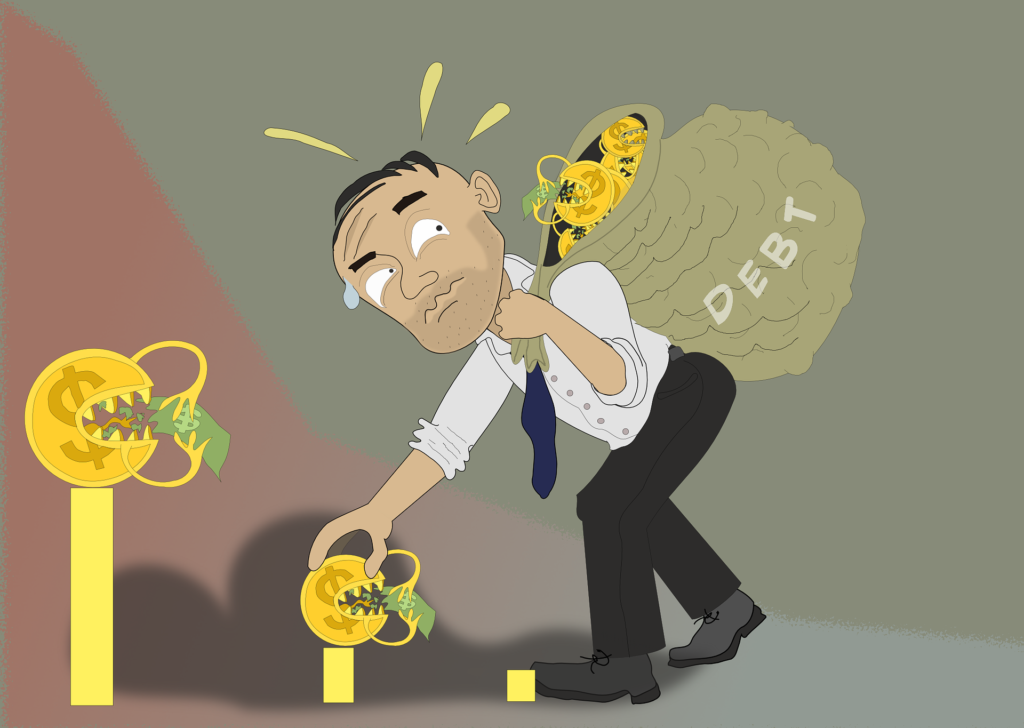This article first appeared in April’s print edition of Business Monthly.
As prices of essentials and non-essentials increase (annual inflation was above 30% in 2023, dipping to 29.8% in January but jumping to 35% in February), many consumers will start to consider how they can maintain their lifestyles by paying for goods and services in installments.
An October report from the Egyptian Financial Regulatory Authority (FRA) said that during the first half of last year, the number of individuals seeking “buy now, pay later (BNPL) schemes when making large or small purchases [increased] 27% … compared to the same period in 2022.”
By contrast, central bank data shows that commercial banks loan-to-deposit ratio in local currency increased from 45% in June 2022 to 45.6% in June 2023. That small growth percentage could hide a decline in consumer lending, as CBE-regulated banks can finance sectors that BNPL can’t, including real estate construction, property purchases, and companies CBE classifies as “large enterprises.”
However, the fast growth of non-bank consumer financing funding has its risks. BNPL plans may increase people’s purchasing power without a corresponding income increase, reported Amira Hisham, a journalist for Ahram Online, in October. “That can have undesirable outcomes.”
Rapid growth
The government began regulating non-bank consumer financing companies in 2009 when it passed a new law giving the FRA full regulatory authority over BNPL companies, instruments, and the overall market.
Local buyers took to the BNPL idea quickly. A note by Shehata & Partners Law Firm in August cited increasing demand for consumer credit by Egypt’s growing middle class. Further fueling that demand are government efforts to promote financial inclusion, expanded access to credit, and rising funding availability for non-banking financial institutions.
Shehata & Partners expects BNPL lending to reach EGP 50 billion by 2025, up from EGP 40.3 billion in March 2023. The law firm said that will be due to the “introduction of credit bureaus and credit scoring systems to determine the worthiness of borrowers, the continued emergence of digital platforms and fintech companies, and financial literacy and awareness programs, which “play a crucial role in promoting financial inclusion and responsible borrowing.”
Further boosting demand for lending in Egypt is the persistently high inflation rate, which is making many products unattainable via traditional payment methods. FRA data shows BNPL enterprises lent EGP 43.32 billion to 3.128 million people in the first 11 months of 2023. That compares to EGP 26.84 billion lent to 2.546 million consumers a year earlier.
Throughout 2023, more people became dependent on consumer financing with every passing month. The FRA’s data showed consumer lending in November was 69% higher than it was a year earlier. That is higher than the 12-month increase of 61.4% from November 2022 to November 2023.
Such factors helped entice mobile operator Orange Egypt to sign a deal in May 2023 with Contact Creditech, a BNPL company, to allow “extended installment programs without down payment or interest” when paying with Orange Cash, the company’s mobile money transfer app.
In December, Vodafone Egypt signed a deal with electronics retailer B.TECH that allows the latter’s customers to use Vodafone Cash to pay for purchases in installments.
Regulating lenders
The Shehata & Partners note stressed the underlying target of the FRA laws is to ensure “transparency and safeguard the interest of consumers in the non-banking sector.”
The key law governing BNPL offers is the Consumer Finance Law, passed in 2020. Its most prominent provisions are that non-bank consumer financiers can’t offer savings options for their clients, and the repayment duration must be six months or longer. Also, they can’t provide leasing or lending to micro enterprises (microfinancing).
The law allows FRA to audit non-bank lenders’ digital infrastructure and technical (back-office) operations. Those companies must also submit “separate accounts and financial statements for consumer finance activities.”
The 2020 law distinguishes between two types of consumer finance firms. “The law differentiates between ‘consumer finance companies’ established to undertake consumer finance activity and ‘consumer finance providers’ who are manufacturers or distributors of goods and undertake consumer finance activity as well,” said a note from Shalakany Law Office.
For consumer finance companies, the 2020 law requires a minimum capitalization of EGP 75 million. “This is a significant amount … designed to protect consumers and ensure the financial stability of the consumer finance companies,” said the Shehata & Partners note.
Providers must allocate at least EGP 25 million to finance their usual operations and a separate EGP 10 million to fund consumer finance activities. Regulatory differences also extend to corporate structures and obligations, as well as their ownership, capital and management structures.
In May 2023, the FRA capped consumer finance companies’ loan portfolios to nine times the company’s capital to protect them and the sector from over-lending to meet increasing demand.
Three months later, the FRA amended the executive regulations to prevent BNPL companies and providers from giving each other or third parties “powers of attorney or authorizations” to lend money on their behalf. The modification closed a loophole in the May amendments that would allow BNPL companies to circumvent the loan portfolio limit.
Danger zone?
The main risk of non-bank consumer financing is it entices people to buy goods they can’t otherwise afford. “BNPL users tend to have a riskier credit profile than those of traditional consumer credit products,” said the Bank of International Settlements (BIS) in December. “BNPL users are typically younger with less education, higher debt burdens and lower credit scores.”
That means they are more likely to delay payments or default. The BIS noted that in some cases, “late payments and losses for BNPL … are higher than in the case of credit cards [which are backed by savings or payroll accounts].” That is part of why BNPL companies usually charge late payment fees that can exceed those of credit cards, BIS added.
Protecting consumers from taking on too much BNPL debt requires government legislation. “It’s crucial to recognize potential risks and establish a regulatory framework to protect customers from over-indebtedness and ensure transparency,” noted a research paper from the Arab Academy for Science, Technology and Maritime Transport (AASTM) in September. “Requiring BNPLs to report to credit bureaus and share data with other lenders could increase consumer credit awareness and encourage responsible borrowing.”
Those laws should be tailored to consumer finance. “[There is a] need for dedicated BNPL regulations to fill gaps in disclosure, affordability assessments, and credit bureau reporting,” the AASTM paper added. “Specific frameworks can address emerging risks like over-indebtedness and ensure consumer protections evolve with new financial services.”
Raising awareness is essential. “BNPL regulatory efforts should incorporate consumer education programs to increase awareness and empower responsible usage,” the report said.
Regulations also need to be practical and adaptable. “Implementing the practical and policy implications will benefit financial institutions, retailers and consumers, and foster a healthy and sustainable BNPL market in Egypt,” AASTM said. Meanwhile, “as BNPL services evolve, policymakers must remain proactive in adapting regulations to protect consumers while fostering innovation and access to affordable credit options.”







